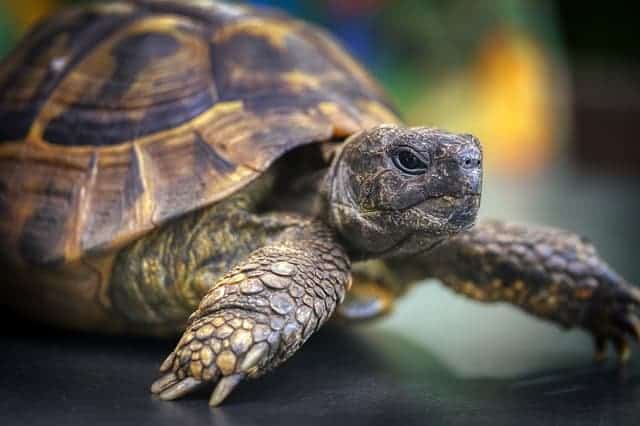Although there are apparent benefits of moisturizing a tortoise’s skin or shell, it usually isn’t necessary. The skin and shell of tortoises, and indeed reptiles in general do not absorb water. Moreover, many moisturising products might not be safe for reptiles. Humidity and drinking water are better ways to hydrate a tortoise.
Sometimes, people who have tortoises notice that the skin or shell of their pet is dry. It can become a real source of concern, and if the owner is new to tortoise husbandry, then he/she might start panicking. Moreover, owners start thinking about moisturizing these areas using certain products, some of which might be outright harmful.
In some cases, they might consider oils that are used for humans, such as argan oil, while other people trust moisturizing products advertised to be safe for tortoises.
So, what should you do if your tortoise is dehydrated? Should you moisturize the skin or shell of the reptile? Read on to find out the answer.
Arguments For Moisturizing Tortoises
People who notice dry skin or shell on their tortoise will be quick to react in some cases. They often don’t know what the right course of action is, and because it seems like the logical thing to do, they might grab different products that are often used by humans and attempt to apply them to the reptile’s skin.
Having said that, people have different reasons for using moisturizing products on their pet tortoise. Here are some of the most common ones:
- “It Doesn’t Do Any Harm”
Some tortoise owners – especially those who are newer to tortoise care – think that these products will not harm their pets. For example, some believe that argan oil is a good option for keeping the shell or skin of their pet hydrated. To some, cold-pressed argan oil is what makes a great substance for topical application on dry skin or shell.
However, the skin and shell do not absorb any water or oil. In fact, this is the case for all reptiles. So, in reality, applying any oil or water on these body areas will not have the desired impact.
So while yes, it may not theoretically do any harm, it probably isn’t of any benefit either.
- “There Are Different Moisturizing Products Intended for Tortoises”
Another argument people use is that different products are marketed specifically for this purpose. Some oils, such as caryophyllus oil, are sold for those who wish to moisturize their tortoises.
These solutions will only give the illusion that the skin or shell are moisturized, when in reality they aren’t. In fact, using oils might do more harm than good.
Oil will not only act as a ‘glue’ that adheres to dirt and grime, but it will also lead to germs being trapped against the skin or shell. Worse still, it might serve as the perfect breeding environment for germs and bacteria, which may ultimately lead to infection .
Arguments Against Moisturizing Tortoises
While some people will try a variety of products to moisturize the tortoise’s skin or shell, equally there are many others who don’t believe it is a good idea. In fact, most people who are more experienced in tortoise care advise against it.
Here are some arguments for not moisturizing your reptile’s skin or shell:
- Tortoises Don’t Have Access to These Products in the Wild
Most experienced tortoise owners know that rule one in the proverbial tortoise care textbook is to imitate the tortoise’s natural environment as far as is possible and practical. This isn’t limited to alimentation, light, warmth, and humidity – it also refers to lesser considered factors such as its skin/shell hydration.
It might seem obvious on reflection, but if you think about it, tortoises in the wild do not have access to the various ointments, oils, or other moisturizing products available to those in captivity. Yet they are able to hydrate themselves perfectly well, without such products being applied to their bodies.
So with that in mind, it stands to reason that those who wish to give their tortoise a life similar to one they might experience in the wild will not use these products. Instead, they will use other, more natural, methods to prevent dehydration.
- Drinking Water Helps More
Tortoises must have access to fresh water on a daily basis. By drinking water, tortoises are able to hydrate themselves and thus prevent dry skin/shell amongst many other ailments. So, all tortoises in captivity need free access to water. At the same time, owners should also make sure their tortoise gets extra water from their food to ensure fluid intake is optimised.
Food and drink based water sources represent a much better way to keep the tortoise in good condition and to ensure dehydration does not become an issue.
- A Humid Environment Is More Beneficial
Tortoises also need some humidity in their environment. If the air is too dry, the skin and shell of the reptile will slowly get dry, despite the fact that tortoises, like all reptiles, have skin that is nearly waterproof.
While some moisture might get absorbed by the skin, the humidity from the air may also be absorbed by the cloaca, and may help hydrate food within the enclosure.
Insufficient humidity can be harmful to tortoise, as it can lead to many different health issues.
In the wild, tortoises will spend time in humid burrows, as well as soaking themselves in water to stay hydrated, when water is available. This way, their shell and skin will naturally look their best.
In captivity, you are responsible for providing them with a bowl of water where they can soak. Whilst your tortoise will likely willingly get in there and soak occasionally, some people also prefer to ‘force’ soak the reptile themselves from time to time, which also helps prevent dehydration.
- Some Products Might Not Be Safe for Tortoises
Whereas some oils may not be harmful to tortoises, others are probably not beneficial for the reptile’s skin or shell. People who refuse to moisturize their tortoises with different products do so because they are wary of the ingredients they contain.
Just because some products are safe for humans and help hydrate our skin, that doesn’t mean they should be used on tortoises. Indeed, unless specific tests have been carried out to determine a product’s safety on tortoises, there is no way of knowing if it is safe or not.
The Bottom Line
In the end, what matters the most is your tortoise’s well-being. So, you need to make sure your tortoise is moisturized without harming it. The best you can do is provide the pet with enough fresh water, keep the air humidity at the right level and soak the tortoise occasionally.
Soaking will keep the skin cells healthy and hydrated. If you must use an oil or lotion, you need to talk to the vet first and make sure the product is used as indicated by the doctor. Don’t overdo it either – only use a very small amount on the skin/shell, as it might be harmful in large amounts.


